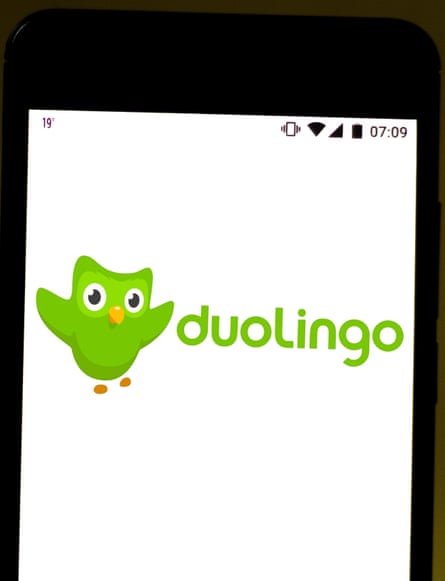This morning, before checking in on my young son or making a coffee, I opened the Duolingo app on my phone and translated “They love smelling meat” into Italian. I’ve been starting my days like this for a few months now: wake up, wash face, grapple with the gerund. I usually spend between 10 and 20 minutes on it while the kettle boils or I load CBeebies or write some emails. It used to be eBay. Then Wordle. Now it’s this.
Duolingo is a language learning app and pretty simple to use. After you’ve chosen which language you want to learn, you are presented with about 100 skill-sets divided by scenario or grammar (grocery shopping, the future tense and so on). Each level is structured like branches of a tree, and when you complete one, you move down the tree earning gems to “spend” on the app or hearts that you need to perform the exercises. Make a mistake, and you must correct it before moving on. It’s all fun and games until you make too many mistakes, run out of hearts and lose your progress. This is when you’ll engage with Duolingo’s mascot, an officious green owl called Duo who, if you’re anything like me, will eventually define your self-esteem. Duo’s face is the first thing I see each day and increasingly, the last thing, too.
Like Tinder, Duolingo launched 10 years ago. But while Tinder took off immediately, Duolingo’s success was more gradual. According to a spokesperson, 14.9 million people now log on daily, over 50% more than in 2021. The last big spike was when Squid Game was released and everyone decided to learn Korean. Before that, it was French, when Call My Agent! aired on Netflix.
Of course, there was the pandemic, when 30 million users worldwide downloaded it during the first few weeks of lockdown. I was one of them. Confronted with the prospect of going absolutely nowhere anytime soon it was the closest thing I could find to a way out. Plus, it was productive and free.

The most popular language is English. But for those who are already English-speakers, the app has 41 complete languages – Spanish and French are the most popular – with the added options of High Valyrian (from Game of Thrones) and Klingon (Star Trek), though not, oddly, Filipino or Bulgarian. It’s not exactly a yardstick for international relations, although the number of users learning Ukrainian through the app grew by 1,171% this spring (Duolingo declined to provide comparable figures for Russian).
I started with Italian because I used to live in Italy so I already spoke it pretty well. I wasn’t fluent but I was good enough to teach English to Fiat executives while living in Turin, form real friendships and, occasionally, date. That pandemic summer, I kept it up for a few months, then, like most people (Reddit estimates it takes three to six months to finish a course), I lost interest and deleted it.
It wasn’t until this past July, while re-watching The Godfather, that I realised the Sicilian dialogue was going over my head. So for the first time in almost two years, I downloaded Duolingo again.
A few weeks in, my Italian was progressing nicely. Of course there was no way of knowing, but lying in the bath at night I imagined I was wandering through the Rialto in Venice buying tomatoes. I could compliment their smell, haggle and if the vendor tried to diddle me, bleat “ma dai!” (Oh, come on!) while shaking my fist. I progressed quickly without mistakes, and began practising out loud, telling my son that while “Africa is not a country” (L’Africa non è un paese), at least “I would still be able to buy fish from the supermarket tomorrow” (domani potrei comprare il pesce al supermercato).
Buoyed up by my progress, I added French (I want to brush up on my AS level before going on holiday with the in-laws). Why stop there though, I thought, adding Portuguese (friends had just moved there and I wanted to feel connected to them) and even Latin (I’m a sucker for derivations!). Soon I was pinballing between all four. I liked how simple it was, that I could quantify my progress in terms of points and, moreover, brag about it by sharing updates with fellow users.
If this sounds as much like a video game as a learning tool, that’s because it is. I asked Emma Clark, an Islamic-garden designer with a robust working knowledge of Arabic, to have a go. “It’s good if you like playing video games more than learning languages” was her takeaway, leaving me to wonder whether I’d become more interested in success than supines.
Ask any Duolinguist and they’ll tell you competition is central – one friend learning French described it as “toxic magic”. This can be good, says Dr Cindy Blanco, Duolingo’s managing editor of learning content. “I taught Spanish at university in the US and in the classroom you could get them to do hard things because of the social pressure to sit and get it done. When you’re learning with an app, if you feel confused, there’s no pressure to progress – unless there’s an element of competition.” Blanco describes it as healthy, but I beg to differ. Users talk bleakly of keeping up streaks at great cost. One friend, who wished to remain anonymous, admitted to not only repeating exercises in order to maintain her now 213-day streak of Spanish, but, on occasion, using Google Translate.
Chris Boyd, 38, who works in film, spent several years learning Russian on the app and could be described as a Duolingo survivor. Boyd became interested in Russian culture after his father left books about the cold war lying around the house. That led to an interest in Russian cinema, but it was a trip to Moscow that prompted him to actively learn. “It hit me how beautiful the language is – somehow it’s both lean and florid at the same time,” he says.
After doing a course at Pushkin House in London, he first used Duolingo as a sort of top-up. But before long it was taking over. “You quickly learn to hack it and try to get through as many lessons as you can for the points, rather than the words and phrases staying in your brain for longer than a couple of hours,” he says. He also hates the owl (I recently came across a Medium post called “Duolingo needs to chill” based on its aggressive use of notifications).
The real question is whether it actually works and how quickly. In an article for the Atlantic, Ta-Nehisi Coates, who learned French as an adult, noted the “symmetry in language ads that promise fluency in three weeks and weight-loss ads that promise a new body in roughly the same mere days”. For me, learning Italian on Duolingo is like applying WD-40 to my bike; it just keeps the wheels turning. French was also easy because I had a solid base. But one month of Portuguese has already made me question just how much of a polyglot I really am, despite these languages supposedly being linked by “lexical similarity”. How quickly you learn varies wildly, although there is a sweet spot. One friend told me it wasn’t until week six that she felt something click (she’s nearing a year learning Italian).
Still, as any linguist will tell you, there is an element of nuance that an app can’t provide. “In the end, using a language is a social thing, not a game,” says Francis Jones, professor of translation studies at Newcastle University. Jones speaks five languages confidently but can converse in about 20. He tried to learn Swedish on Duolingo but found the vocabulary too random to be of much use (there’s a fun Twitter account called @shitduosays that collects the best). He also completed five levels of Chinese “but couldn’t have a conversation”, he says. “Its mission, which it’s very good at, is showing you how to memorise words, pronounce them and read and recognise certain vocabulary. Sadly you can’t always transplant that just so.”

Jones’s second language is Dutch, which he learned living in the Netherlands in the late 70s. “That is the ideal environment, language coming at you from all sides,” he says. “But more than that, I needed to earn a living and then, well, I met my wife. Motivation is crucial,” he says. I learned Italian because I had mapped out a romantic future for myself, but once there, I also needed to eat.
It comes down to how you like to learn. I am appalling at grammar because I have no interest in the nuts and bolts and mainly learned Italian through mimicry of my housemates. It was said that I spoke Italian with a northern/Milanese accent and swore with a Venetian one. For someone like me, Duolingo is ideal. Jones, who generously calls my approach “holistic” or “top-down” because I mimic the phrase, memorise it and only then break down the phrase into words, prefers working from the bottom up: “I am analytic. I like to know the bones, the nuts and bolts, but then you go out, you use it.” This is how he became fluent in Dutch in about three months and why I probably never will.
I didn’t learn Italian to become a linguist. I liked who I was in Italy and when I’m away too long, I feel homesick for it. Knowing another language feels like a superpower. To speak a new language, says Jones, “one gets to switch into a new personality, like trying on a new set of clothes”.
As for learning it on an app, I suspect Duolingo’s limitations will get the better of me. As Boyd says: “There’s nothing that can really replace the feeling of sitting in front of another human being and attempting to communicate with them.”
Stay connected with us on social media platform for instant update click here to join our Twitter, & Facebook
We are now on Telegram. Click here to join our channel (@TechiUpdate) and stay updated with the latest Technology headlines.
For all the latest Education News Click Here
